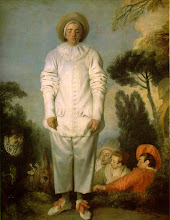"It was one of those delightfully irregular houses where you go up and down steps out of one room into another, and where you come upon more rooms when you think you have seen all there are, and where there is a bountiful provision of little halls and passages, and where you find still older cottage-rooms in unexpected places, with lattice windows and green growth pressing through them. Mine, which we entered first, was of this kind, with an up-and-down roof, that had more corners in it than I ever counted afterwards, and a chimney (there was a wood fire on the hearth) paved all around with pure white tiles, in every one of which a bright miniature of the fire was blazing. Out of this room, you went down two steps, into a charming little sitting-room, looking down upon a flower-garden, which room was henceforth to belong to Ada and me. Out of this you went up three steps, into Ada’s bedroom, which had a fine broad window, commanding a beautiful view (we saw a great expanse of darkness lying underneath the stars), to which there was a hollow window-seat, in which, with a spring-lock, three dear Adas might have been lost at once. Out of this room, you passed into a little gallery, with which the other best rooms (only two) communicated, and so, by a little staircase of shallow steps, with a number of corner stairs in it, considering its length, down into the hall. But if, instead of going out at Ada’s door; you came back into my room, and went out at the door by which you had entered it, and turned up a few crooked steps that branched off in an unexpected manner from the stairs, you lost yourself in passages, with mangles in them, and three-cornered tables, and a Native-Hindoo chair, which was also a sofa, a box, and a bedstead, and looked, in every form, something between a bamboo skeleton and a great bird-cage, and had been brought from India nobody knew by whom or when. From these, you came on Richard’s room, which was part library, part sitting-room, part bed-room, and seemed indeed a comfortable compound of many rooms. Out of that, you went straight, with a little interval of passage, to the plain room where Mr Jarndyce slept, all the year round, with his window open, his bedstead without any furniture standing in the middle of the floor for more air, and his cold-bath gaping for him in a smaller room adjoining. Out of that, you came into another passage, where there were back-stairs, and where you could hear the horses being rubbed down, outside the stable, and being told to Hold up, and Get over, as they slipped about very much on the uneven stones. Or you might, if you came out at another door (every room had at least two doors), go straight down to the hall again by half-a-dozen steps and a low archway, wondering how you got back there, or had ever got out of it.
The furniture, old-fashioned rather than old, like the house, was as pleasantly irregular. Ada’s sleeping-room was all flowers — in chintz and paper, in velvet, in needle-work, in the brocade of two stiff courtly chairs, which stood, each attended by a little page of a stool for greater state, on either side of the fire-place. Our sitting-room was green; and had, framed and glazed, upon the walls, numbers of surprising and surprised birds, staring out of pictures at a real trout in a case, as brown and shining as if it had been served with gravy; at the death of Captain Cook; and at the whole process of preparing tea in China, as depicted by Chinese artists. In my room there were oval engravings of the months — ladies haymaking in short waists, and large hats tied under the chin, for June — smooth-legged noblemen, pointing, with cocked-hats, to village steeples, for October. Half-length portraits, in crayons, abounded all through the house; but were so dispersed that I found the brother of a youthful officer of mine in the china-closet, and the grey old age of my pretty young bride, with a flower in her bodice, in the breakfast room. As substitutes, I had four angels, of Queen Anne’s reign, taking a complacent gentleman to heaven, in festoons, with some difficulty; and a composition in needle-work representing fruit, a kettle, and an alphabet. All the movables, from the wardrobes to the chairs and tables, hangings, glasses, even to the pincushions and scent-bottles on the dressing-tables, displayed the same quaint variety. They agreed in nothing but their perfect neatness, their display of the whitest linen, and their storing-up, wheresoever the existence of a drawer, small or large, rendered it possible, of quantities of rose-leaves and sweet lavender. Such, with its illuminated windows, softened here and there by shadows of curtains, shining out upon the star-light night; with its light, and warmth, and comfort; with its hospitable jingle, at a distance, of preparations for dinner; with the face of its generous master brightening everything we saw; and just wind enough without to sound a low accompaniment to everything we heard; were our first impressions of Bleak House."
From the sixth chapter of
Bleak House, by Charles Dickens. Also, don't miss the superb BBC
adaptation.





































































